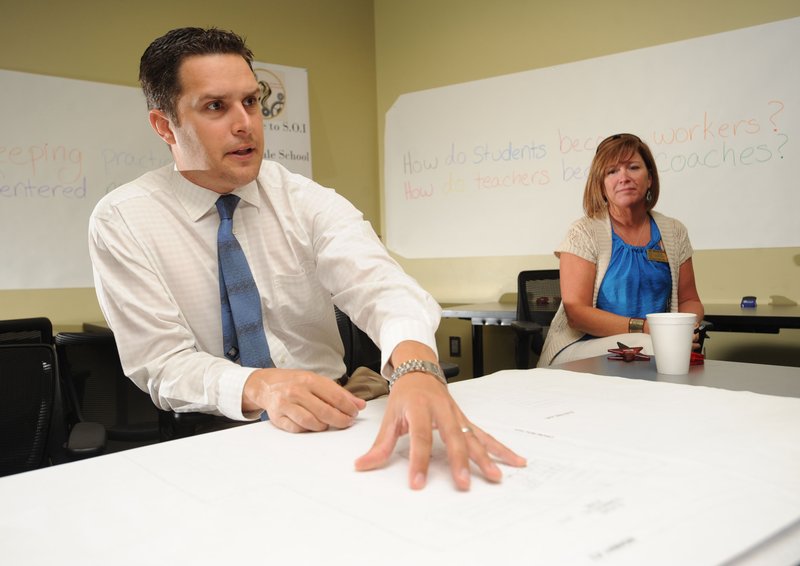SPRINGDALE -- Administrators hope to expand programs at the School of Innovation by changing it to a district-run charter school.
District officials notified the state Department of Education of the district's plans to ask for the designation in April and received approval from the School Board this month to move forward with a formal application, due to the department July 28.
School of Innovation
• Plans announced in fall 2013.
• State grants school of innovation status in summer 2014.
• Opens with 200 eighth-graders in temporary space in the Jones Center in August 2014.
• School will enroll about 400 eighth- and ninth-graders at the Jones Center in August.
• School of Innovation to move to permanent home in August 2016.
Source: Staff report
Timeline
Timeline for proposed district-conversion charter schools
July 28: Applications due for proposed charter schools
August-October: Department of Education Charter Internal Review Committee evaluates applications for district-conversion charter schools
November: State Charter Authorizing Panel conducts hearings for proposed district-conversion charter schools
December: State Board of Education decides whether to review the panel’s decisions
Source: Arkansas Department of Education
A public hearing on the proposal is set for 6 p.m. June 30 at the Jones Center, where the school is located.
The School of Innovation began as a way to reinvent high school into a flexible learning environment where students learn at their own pace, Principal Joe Rollins told School Board members last week. The school focuses on integrating science, technology, engineering and math. Each student receives a laptop computer.
The school had 191 eighth-graders in its first year, Rollins said. For 2015-16, the school will have about 400 eighth- and ninth-graders and will continue adding another grade each year until it becomes an eighth- through 12th-grade school with about 1,000 students. More than one-third of the students are participating in summer learning programs offered by the School of Innovation.
"This is not about taking anything away from what we currently offer," Rollins said. "We are simply trying to ask the question about what more can we offer."
For years, state law allowed school districts and independent nonprofit groups to establish public charter schools. Charter schools were granted waivers from state regulations to experiment. The state Legislature in 2013 passed Act 601, sponsored by state Sen. Joyce Elliott, D-Little Rock, to give public school districts another avenue for experimenting with different instructional and administrative practices.
The Springdale School of Innovation was among the state's first six schools of innovation approved in the summer of 2014 under the new law.
Charter schools and innovation schools are public schools. Charter schools are eligible to apply to the state for grants from the U.S. Department of Education. The state does not provide funding for schools of innovation.
Starting the School of Innovation gave the Springdale district time to explore changes in the way teachers conduct classes, said Megan Witonski, assistant superintendent for innovation and accountability.
The district could go back to the department and seek approval for changes as a school of innovation, but district officials decided the better option was to seek a charter, she said.
"The idea is really about taking what we're doing right now and opening up more offerings for students," Witonski said.
With a charter, the district can seek approval to infuse gifted and talented instruction in all classes throughout the school day without having to offer a specific class period for gifted and talented instruction, Witonski said. That option isn't available as a waiver for schools of innovation.
School officials want to bring industry experts into the school to contribute instruction and work with students on projects, which also requires waivers from state regulations on teacher licenses, Witonski said.
School officials plan to build an online platform initially for School of Innovation students to be able to take some or all of their courses online and eventually for pupils across the district in kindergarten through 12th grade, Rollins said. Students would still have access to face-to-face instruction, but the online offerings would benefit students who are not able to come to the campus, including home-bound students or athletes who travel, Rollins said.
"I'd like to offer an opportunity for all students to be a part of our campus," Rollins said.
If granted, the School of Innovation would convert to a charter when it moves to its permanent home on Hylton Road across from Lakeside Junior High School. The district is in the early stages of a project to build a $24 million, 143,000-square-foot campus there with a front office and reception area and one instructional wing, said Gary Compton, assistant superintendent for support services.
The district is preparing the site for construction, Compton said. He anticipates that crews will begin to move dirt on the site within the next month.
The new campus is expected to open with an enrollment of about 600 to 650 students in the eighth through 10th grades, Compton said.
Brenda Bernet can be reached by email at [email protected] or on Twitter @NWABrenda.
NW News on 06/22/2015

